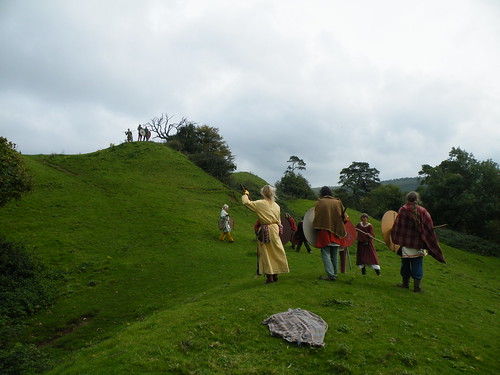Since 2014, DAS has been following the Anglo-Saxon Chronicle for the 870s, year-by-year, trying to see how our units would have fitted in to the wars and treacheries of that time. It’s been lots of fun, and we’d like to continue it into the 880s…
But first, a reminder of what’s already happened, as the 870s saw sweeping changes across Britain, with the Vikings and Saxons both suffering terrible losses and celebrating great victories.
In 872 London was sacked by the Vikings, and the Viking units of DAS fell upon the refugees being escorted to safety by the Saxon units.
In 874, a series of events finally saw King Burhred of Mercia driven from his lands, with King Ceolwulf taking his place and inviting Vikings to settle there – an expensively bought peace! However, Ivar Ragnarsson of the Vikings died in the battle winning the peace, leaving the Vikings without a clear leader…
In 875 the Vikings quarrelled over who should rule them. Meanwhile, King Alfred of Wessex stepped up to claim he was the natural leader of all free Englisc, harrying the sea-raiders and looting the looters.
In 876, King Harald Finehair of Norway sought to gain control of the Isles and Northumbria – but was driven out of Northumbria at least by Vikings united under Halfdan Ragnarsson, with the Westmen seizing the Raven Banner of Finehair’s forces. Halfdan said the Vikings should secure the north before pushing to take Wessex; but Guthrum said they should take Wessex whilst they had momentum. The Oestvikinga and Holmbyggjar followed Guthrum to war, whilst the Westmen followed Halfdan north – where they got caught up in some very complex politics and all sorts of treacheries between Britons, Scots, and Picts. Meanwhile, the Cilternsaete fled Ceolwulf’s Mercia and took refuge in Wessex, where they aided Anir Thane’s Sumorsaete in defending Alfred’s borders. Guthrum’s forces took Wareham but were trapped there – and the Saxons took Vikings as hostages in exchange for peace.
In 877 the hostages broke free, and fled with the rest of Guthrum’s forces across Wessex, seeking to join up with a naval force sent to Exeter… But the naval force was destroyed, and the Englisc scattered the fractured Vikings.
In 878 news came of the deaths of the last two Ragnarssons, Ubbe and Halfdan. Guthrum unified the Viking forces, proudly bearing at least one Raven Banner, and pressed Wessex hard. But the Englisc managed to get word from Alfred, who was sheltering in a swamp, and rose up in great fury. Guthrum was defeated, forced to be baptised and become Athelstan. The whole of what is today England was divided into Danelaw and Wessex.
And so, in 879, a great peace fell upon the land. There were occasional border disputes, and trouble makers sometimes sought to re-ignite old wars (although Hauk of the Oestvikingae’s attempt to steal a Saxon Thegn’s helmet to stir up trouble came to naught), but the two forces had time to rebuild and settle.
But no peace lasts forever, and we’re now entering the 880s. Of course, the pandemic has slightly disrupted our plans! But luckily 880 and 881 are both fairly quiet, in England at least:
A.D. 880. This year went the army from Cirencester into East-Anglia, where they settled, and divided the land. The same year went the army over sea, that before sat at Fulham, to Ghent in Frankland, and sat there a year.
A.D. 881. This year went the army higher up into Frankland, and the Franks fought with them; and there was the army horsed after the battle.
As we haven’t had any fighting events for a while, and it might be a while before we get any, it is worth thinking what your character is up to in this time!
Vikings, are you settling and dividing the land of East Anglia (this is probably the time that the Holmbyggjar get settled into Osea Island)? Or are you heading up to Northumbria or the Isles, and looking after lands there (off to Canna, or Mann)? Or are you off pillaging France?
For the Saxons, this is probably the time that Alfred really builds up the network of fortified burhs to defend his borders, the Burghal Hidage. They were possibly started in the late 870s, but this was a chance to turn them into permanent and significant fortifications. It was also quite possibly a time he built up his own fleet of ships – 882 features a Wessex naval victory against the Vikings. How might your characters fit into this time of preparation, what are they doing to help Alfred?
One big storyline that we’re keen to play through once we’re all back together is the fate of Mercia. It is in the late 870s or early 880s that Viking-appeasing King Ceolwulf of Mercia is replaced by Æthelred of Mercia – although Wessex always regards Æthelred as an ealdorman under Alfred, not a king in his own right (and Æthelred only holds West Mercia, as the Vikings keep control of the East). One of Æthelred’s first actions (possibly once he is in charge, or possibly under Ceolwulf) is an invasion of Wales, but he is roundly beaten at the Battle of Conwy in 881. Hauk and Herewulf both have plans for events that could be themed around this storyline and the shifting sands in Mercia, which they’d hoped to run this year but look forward to running when we can.
Looking further forward, the 880s are also characterised by Alfred going on the attack: fighting in London, Rochester, Stourmouth… Plus treachery from the Vikings in East Anglia, and no doubt plenty of border skirmishes! But there are fewer large sweeping changes in political leaders, so it should be a good time to focus more on our personal stories and rivalries and less on “wait, who is king now?”






